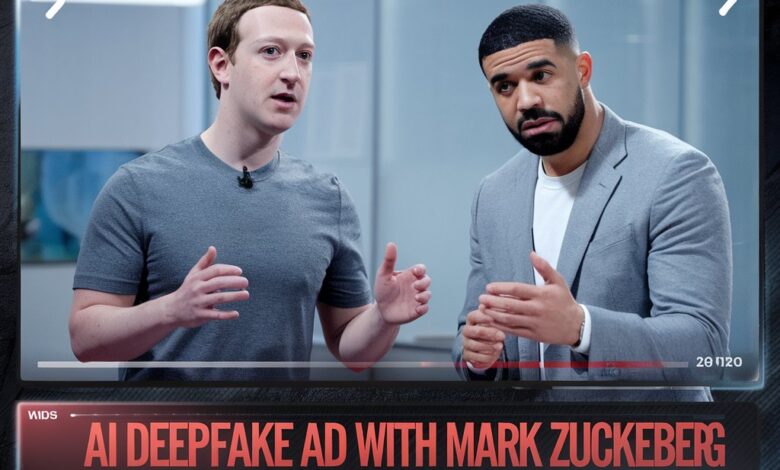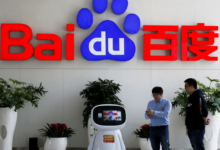
A viral AI deepfake ad featuring Mark Zuckerberg, Drake, and other celebrities highlights the growing dangers of synthetic media and deepfake technology.
The Rise of AI Deepfakes – A Troubling Trend in 2025

Artificial intelligence is evolving at an unprecedented rate, and one of its most controversial applications is deepfake technology. Recently, an AI-generated video featuring Mark Zuckerberg, Drake, Adam Sandler, and other celebrities wearing “F Kanye” T-shirts went viral, sparking a heated debate on AI ethics, misinformation, and digital identity theft.
While the video may seem like a humorous take on Kanye West’s latest controversies, it raises serious concerns about the manipulative power of AI-generated content.
Let’s explore the implications of deepfake technology, its increasing presence in social media, and the urgent need for regulations.
The Viral AI Deepfake Video – What Happened?
A recently surfaced AI-generated advertisement shows deepfake versions of several celebrities wearing a controversial T-shirt aimed at Kanye West. Some of the notable figures in the deepfake video include:
- Mark Zuckerberg
- Drake
- Adam Sandler
- Scarlett Johansson
- Mila Kunis
- Jerry Seinfeld
- Ben Stiller
- David Schwimmer
- Lenny Kravitz
- Sacha Baron Cohen
- Woody Allen
- Sam Altman (OpenAI CEO)
The T-shirt in the video features a Star of David in the center of a middle finger, adding political and religious connotations to the already inflammatory nature of the clip.
The fake ad, which has garnered over 875,000 views and 16,000 likes on X (formerly Twitter), ends with the slogan:
“Enough is Enough.”
Adding to the eerie nature of the video, a rendition of the Jewish folk song “Hava Nagila” plays in the background, further emphasizing its provocative and unsettling tone.
AI Deepfakes: Misinformation, Propaganda, and Digital Identity Theft
The viral deepfake ad is just one example of AI-generated misinformation spreading rapidly on social media. The technology behind deepfakes has progressed to the point where even seasoned experts struggle to differentiate between real and synthetic media.
1. Political Manipulation and Fake News
AI deepfakes have become a tool for political propaganda and deception. From fabricated speeches to manipulated videos of world leaders, deepfake technology is being weaponized to influence elections and spread false narratives.
- In 2024, an AI-generated video of French President Emmanuel Macron was released to promote the AI Action Summit.
- During the 2020 U.S. elections, deepfake videos of Joe Biden and Donald Trump were widely circulated, leading to misinformation campaigns.
2. Celebrity Deepfakes – Exploitation in the Entertainment Industry
Celebrities are frequent targets of AI deepfake manipulation. The entertainment industry has already seen multiple cases where fake videos, voices, and images have been misused.
One of the most infamous incidents involved Scarlett Johansson, who was unknowingly imitated by OpenAI.
- OpenAI introduced a ChatGPT voice assistant named “Sky”, which sounded eerily similar to Johansson.
- Johansson revealed that OpenAI had approached her for voice licensing, which she declined.
- Despite her refusal, the AI-generated voice still resembled her without consent, sparking widespread backlash.
Following public outrage, OpenAI CEO Sam Altman issued an apology and removed the voice model from their system.
3. AI-Generated Explicit Content – A Growing Crisis
The rise of nonconsensual AI-generated sexual content is another pressing concern. Recently, AI-generated sexually explicit images of Taylor Swift were widely shared across social media platforms.
This alarming trend led to:
- Increased calls for stricter AI content regulations.
- The introduction of a U.S. bill criminalizing nonconsensual AI-generated explicit imagery.
- Major Hollywood talent agencies, such as William Morris Endeavor and Creative Artists Agency, hiring firms to combat AI-generated deepfakes.
Shopify Shuts Down Kanye West’s Yeezy Store – AI Deepfake Timing?
The viral deepfake ad surfaced amid Kanye West’s latest controversy, where Shopify shut down his Yeezy store after he attempted to sell a swastika-themed T-shirt titled “HH-01” (Heil Hitler-01).
The Anti-Defamation League (ADL) condemned the move, and Shopify swiftly terminated West’s store from its platform.
This raises the question:
Was the AI deepfake video a direct response to Kanye West’s actions, or a separate orchestrated attempt to push an agenda?
The timing of the AI-generated ad certainly raises eyebrows.
The Future of AI Deepfake Technology – Regulation is Crucial
As deepfake AI continues to evolve, the need for legal regulations and technological safeguards has never been greater.
Potential Solutions to Combat AI Deepfakes:
- AI Watermarking Technology – Embedding digital fingerprints to distinguish authentic vs. AI-generated media.
- Stronger Copyright Laws – Implementing strict penalties for those creating harmful deepfakes.
- AI Content Moderation – Social media platforms must improve their deepfake detection algorithms.
- AI Ethics Committees – A governing body overseeing AI-generated content.
With AI becoming more advanced, bad actors will continue to exploit deepfake technology. Governments and tech companies must work together to regulate and mitigate the misuse of AI-generated media.
FAQs About AI Deepfakes and Synthetic Media
1. What is AI Deepfake Technology?
AI deepfakes use machine learning algorithms to create realistic yet fake videos, images, and audio, often mimicking real people.
2. How Are AI Deepfakes Made?
Deepfake AI models train on thousands of images and voice samples to accurately replicate a person’s face and speech patterns.
3. Are AI Deepfakes Dangerous?
Yes. AI deepfakes can be used for misinformation, fraud, blackmail, and character defamation.
4. Can AI Deepfakes Be Detected?
Yes, but it’s becoming harder. Companies like Meta, Google, and OpenAI are developing deepfake detection tools to combat this issue.
5. Is There a Law Against AI Deepfakes?
Some countries have introduced laws against malicious deepfakes, but global regulations are still in development.
6. How Can I Protect Myself From AI Deepfakes?
- Verify sources before believing viral content.
- Use AI detection tools like Deepware Scanner.
- Report and flag misleading AI-generated videos.







